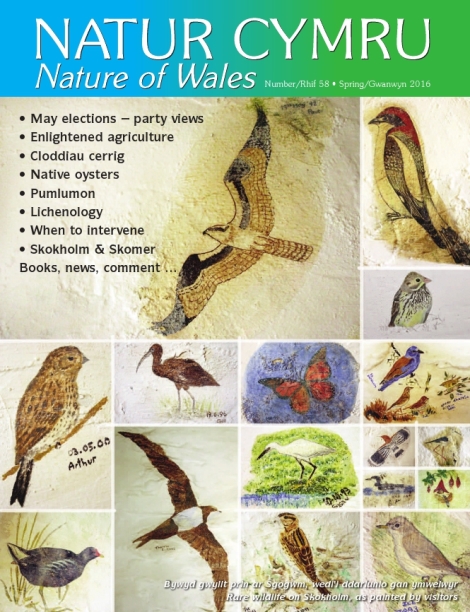
Following the work of Natural Resources Wales
Building a resilience: the principles of Sustainable Management of Natural Resources
Russell De’Ath
News from Coed Cadw, the Woodland Trust in Wales
How green is my city? The importance of urban trees
Rory Francis
BASC programme of mink control to protect water voles
Audrey Watson
Our regular look at the islands off the Welsh coast. This time:
News from the Skerries, and overwintering on the offshore islands of Wales
Geoff Gibbs
Rewilding the ranges
David Elias
The Essential Guide to Beachcombing and the Strandline in Wales by Steve Trewhella & Julie Hatcher
Rhayader by Nature by Bob Dennison, Steve Jones, Richard Knight, Sorcha Lewis, Phil Ward & Ray Woods
The Island Artist by Ann Lockley & Martin Lockley
Our regular page from the charity Buglife
Urban Buzz – creating wildlife areas for invertebrates
Michelle Bales
Interesting insights from the National Museum Wales
Moulding and casting a fossilised coral
Annette Townsend, Caroline Buttler and Cindy Howells
To paraphrase a famous party political poster – ‘Nature conservation isn’t working’. Despite a higher profile, greater legislation and changes of political power, the environment in Wales is suffering more than ever and species and habitats seem unable to recover from their losses. ROB PARRY asks if we need to cross the boundary of non-intervention and do more to help.
For over half a century, decline has been the story for upland areas like Pumlumon; decline in biodiversity, rural communities, and the services which the uplands provide for wider society. One Wildlife Trust is deeply involved in efforts to reverse this trend, and establish an economy based on sustainable land management which will benefit people, nature and natural processes, as LIZ LEWIS-REDDY explains.
DAVID SAUNDERS reports on the pioneering work carried out 70 years ago on the islands of Skokholm and Skomer.
It is clear to most of us that endless economic growth can only be achieved at the expense of an increasingly fragile biosphere. Colin Tudge has been writing about and campaigning for a different approach to the economics and practice of farming for several decades. Here IAN RAPPEL records Colin’s thoughts on conventional farming, biodiversity loss and an alternative, enlightened approach to agriculture.
As filter feeders, oysters are instrumental in maintaining good water quality by sifting phytoplankton and sediment from the water column, but a combination of over-fishing and pollution has drastically reduced numbers of native oysters around Wales. Water quality and dependant species have suffered as a result. ANDY WOOLMER is at the forefront of a scheme to bring back oysters to Swansea Bay.
Embarking on a new field of study can be difficult but the rewards invariably outweigh the difficulties, as TRACEY LOVERING discovered when she became fascinated by lichens.
Stone walls are an integral part of the landscape of many of the Welsh uplands. They can tell us a great deal about the history of agriculture in Wales and are important habitat and haven for wildlife. This article by TWM ELIAS, JOHN H. DAVIES and DAVID ROBERTS is based on discussions held in a conference, ‘In praise of our stone walls’ which was held at Plas Tan y Bwlch, Maentwrog in April 2014.
This article is written in Welsh.
Do environmental issues influence the way people vote? From the media interest which the subject has attracted in recent elections, you might conclude that the answer is ‘not much’ or ‘not at all’. Judging by what we know of our readership, many people in Wales feel passionately about environmental issues. But how easy is it to judge and compare the environmental approaches of the main political parties ahead of the Welsh Assembly elections in May?
Natur Cymru wrote to the six main political parties asking for their approaches to the environmental problems facing Wales in the 21st century. In Issue 58 we summarised the responses we received
